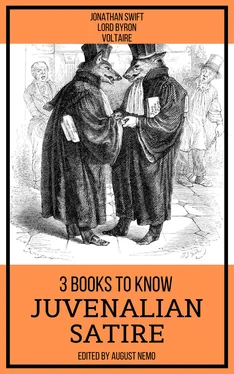The best is that in short-hand ta'en by Gurney,
Who to Madrid on purpose made a journey.
But Donna Inez, to divert the train
Of one of the most circulating scandals
That had for centuries been known in Spain,
At least since the retirement of the Vandals,
First vow'd (and never had she vow'd in vain)
To Virgin Mary several pounds of candles;
And then, by the advice of some old ladies,
She sent her son to be shipp'd off from Cadiz.
She had resolved that he should travel through
All European climes, by land or sea,
To mend his former morals, and get new,
Especially in France and Italy
(At least this is the thing most people do).
Julia was sent into a convent: she
Grieved, but, perhaps, her feelings may be better
Shown in the following copy of her Letter:—
'They tell me 't is decided; you depart:
'T is wise—'t is well, but not the less a pain;
I have no further claim on your young heart,
Mine is the victim, and would be again;
To love too much has been the only art
I used;—I write in haste, and if a stain
Be on this sheet, 't is not what it appears;
My eyeballs burn and throb, but have no tears.
'I loved, I love you, for this love have lost
State, station, heaven, mankind's, my own esteem,
And yet can not regret what it hath cost,
So dear is still the memory of that dream;
Yet, if I name my guilt, 't is not to boast,
None can deem harshlier of me than I deem:
I trace this scrawl because I cannot rest—
I 've nothing to reproach, or to request.
'Man's love is of man's life a thing apart,
'T is woman's whole existence; man may range
The court, camp, church, the vessel, and the mart;
Sword, gown, gain, glory, offer in exchange
Pride, fame, ambition, to fill up his heart,
And few there are whom these cannot estrange;
Men have all these resources, we but one,
To love again, and be again undone.
'You will proceed in pleasure, and in pride,
Beloved and loving many; all is o'er
For me on earth, except some years to hide
My shame and sorrow deep in my heart's core;
These I could bear, but cannot cast aside
The passion which still rages as before—
And so farewell—forgive me, love me—No,
That word is idle now—but let it go.
'My breast has been all weakness, is so yet;
But still I think I can collect my mind;
My blood still rushes where my spirit 's set,
As roll the waves before the settled wind;
My heart is feminine, nor can forget—
To all, except one image, madly blind;
So shakes the needle, and so stands the pole,
As vibrates my fond heart to my fix'd soul.
'I have no more to say, but linger still,
And dare not set my seal upon this sheet,
And yet I may as well the task fulfil,
My misery can scarce be more complete:
I had not lived till now, could sorrow kill;
Death shuns the wretch who fain the blow would meet,
And I must even survive this last adieu,
And bear with life, to love and pray for you!'
This note was written upon gilt-edged paper
With a neat little crow-quill, slight and new:
Her small white hand could hardly reach the taper,
It trembled as magnetic needles do,
And yet she did not let one tear escape her;
The seal a sun-flower; 'Elle vous suit partout,'
The motto cut upon a white cornelian;
The wax was superfine, its hue vermilion.
This was Don Juan's earliest scrape; but whether
I shall proceed with his adventures is
Dependent on the public altogether;
We 'll see, however, what they say to this:
Their favour in an author's cap 's a feather,
And no great mischief 's done by their caprice;
And if their approbation we experience,
Perhaps they 'll have some more about a year hence.
My poem 's epic, and is meant to be
Divided in twelve books; each book containing,
With love, and war, a heavy gale at sea,
A list of ships, and captains, and kings reigning,
New characters; the episodes are three:
A panoramic view of hell 's in training,
After the style of Virgil and of Homer,
So that my name of Epic 's no misnomer.
All these things will be specified in time,
With strict regard to Aristotle's rules,
The Vade Mecum of the true sublime,
Which makes so many poets, and some fools:
Prose poets like blank-verse, I 'm fond of rhyme,
Good workmen never quarrel with their tools;
I 've got new mythological machinery,
And very handsome supernatural scenery.
There 's only one slight difference between
Me and my epic brethren gone before,
And here the advantage is my own, I ween
(Not that I have not several merits more,
But this will more peculiarly be seen);
They so embellish, that 't is quite a bore
Their labyrinth of fables to thread through,
Whereas this story 's actually true.
If any person doubt it, I appeal
To history, tradition, and to facts,
To newspapers, whose truth all know and feel,
To plays in five, and operas in three acts;
All these confirm my statement a good deal,
But that which more completely faith exacts
Is that myself, and several now in Seville,
Saw Juan's last elopement with the devil.
If ever I should condescend to prose,
I 'll write poetical commandments, which
Shall supersede beyond all doubt all those
That went before; in these I shall enrich
My text with many things that no one knows,
And carry precept to the highest pitch:
I 'll call the work 'Longinus o'er a Bottle,
Or, Every Poet his own Aristotle.'
Thou shalt believe in Milton, Dryden, Pope;
Thou shalt not set up Wordsworth, Coleridge, Southey;
Because the first is crazed beyond all hope,
The second drunk, the third so quaint and mouthy:
With Crabbe it may be difficult to cope,
And Campbell's Hippocrene is somewhat drouthy:
Thou shalt not steal from Samuel Rogers, nor
Commit—flirtation with the muse of Moore.
Thou shalt not covet Mr. Sotheby's Muse,
His Pegasus, nor anything that 's his;
Thou shalt not bear false witness like 'the Blues'
(There 's one, at least, is very fond of this);
Thou shalt not write, in short, but what I choose:
This is true criticism, and you may kiss—
Exactly as you please, or not,—the rod;
If any person should presume to assert
This story is not moral, first, I pray,
That they will not cry out before they 're hurt,
Then that they 'll read it o'er again, and say
(But, doubtless, nobody will be so pert)
That this is not a moral tale, though gay;
Besides, in Canto Twelfth, I mean to show
The very place where wicked people go.
If, after all, there should be some so blind
To their own good this warning to despise,
Led by some tortuosity of mind,
Not to believe my verse and their own eyes,
And cry that they 'the moral cannot find,'
I tell him, if a clergyman, he lies;
Should captains the remark, or critics, make,
They also lie too—under a mistake.
The public approbation I expect,
And beg they 'll take my word about the moral,
Which I with their amusement will connect
(So children cutting teeth receive a coral);
Meantime, they 'll doubtless please to recollect
My epical pretensions to the laurel:
For fear some prudish readers should grow skittish,
I 've bribed my grandmother's review—the British.
I sent it in a letter to the Editor,
Who thank'd me duly by return of post—
I 'm for a handsome article his creditor;
Читать дальше












